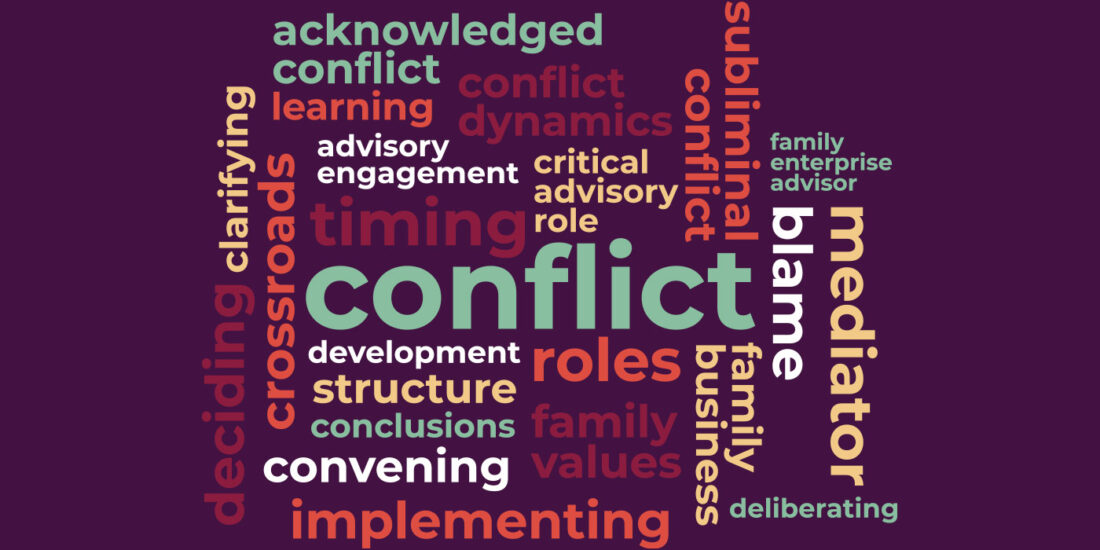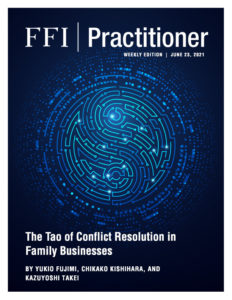
View this edition in our enhanced digital edition format with supporting visual insight and information.
Thanks to this week’s contributors and members of the FFI Asian Circle Virtual Study Group, Yukio Fujimi, Chikako Kishihara, and Kazuyoshi Takei, for their article that provides an overview of the Taoist approach to family therapy. In their article, the authors explain the related concept of “negative capability” and explore how integrating aspects of both Taoist and more traditional approaches to family therapy can create a more holistic view of family enterprise clients.
Different Tao in the traditional and Taoist family therapies
Tao, which translates to “path,” is one of the ancient Chinese spiritual concepts guiding the relationships between humans, and between humans and nature. According to the Chinese philosophical classic Tao Te Ching, there are two types of Tao: One that you can talk about, and another that you cannot.
Traditional family therapy has dealt with the first type in a family through the lens of systems theory. On the contrary, Taoist family therapy focuses on the second Tao that you cannot describe in words. Such Tao can be irrational, unexpected, mysterious, and ungraspable since it consists of not only a Yang (positive and rational) element but also a Yin (negative and irrational) one.
To get along with the second Tao, we need what the British poet John Keats described as “negative capability,” or the ability to accept and contain uncertainties and doubts without much irritation or anxiety. As advisors, we are often trained to provide solutions from the Yang side and are uncomfortable with ambiguities in the system, failing to see the value of negative capability at times.
In this article, we will discuss the differences between the traditional and the Taoist approach to family therapy, and how we can integrate Yin and Yang to provide a more holistic view in our advisory practice. We will also examine how advisors can better intuit and build the negative capability essential for the Taoist advisory practice.
Understanding rationality and irrationality
In family business advising, we seek to understand underlying business issues by means of facts, numbers, and rationality. Advisors make use of hard skills such as finance and accounting to resolve business issues. Similarly, the traditional family therapy approaches family issues by extracting the “system” or “systemic structure” in the family. Therapists use soft skills to intervene in the underlying system or systemic structure, and such interventions are based on our rational logic of causality. However, families and individuals are comprised of emotions, which can be irrational and cannot be easily interpreted through the lens of rationality. We need a different set of logic to understand this.
To the Taoist family therapist, Tao is the governing force or organizing principle in the family and the family business over generations. Tao is the key for health, wealth, integrity, and sustainability of the family business in the long run. It is represented through the same or a similar unseen pattern in the family, repeated from generation to generation unless it is worked on mindfully. The unseen pattern is called the “dreaming pattern” by the Process Work, a neo-Jungian process-oriented psychotherapy approach. It emerges through the same or similar unexpected physical and psychological symptoms, mysterious tragedies, triangulations, accidents, repeated nightmares, and so on across generations.
We see a parallel between the Western psychology and the eastern Tao. The word “psychology” is derived from two Greek words: psyche (meaning “mind” or “soul”) and logos (meaning “study” or “logic”). Tao runs on psyche’s logic and focuses on irrationality and intuition. On the contrary, our usual advisory practice is shaped by the ordinary logic based on rationality.
An integrative approach of East and West
We have practiced the combination of traditional family system therapy and the Taoist family therapy for more than 30 years. In our recent meeting with the FFI Asian Circle in June 2021, we shared our integrative practice with the understanding of (1) the difference between the “system” and the “Tao” in the family; (2) how to see through the “dreaming pattern,” or “constellation,” a term coined by Carl Gustav Jung, and the Yang/Yin balance; (3) how the “constellation” governs both the family and the business simultaneously in a mysterious manner; and (4) the reason why Tao is the governing force for the sustainability, innovation, and creativity of family businesses.
It is of first importance for a Taoist family therapist to see through the given “constellation” or “dreaming pattern” below such irrational phenomena as unexpected symptoms, tragedies, triangulations, accidents, and nightmares.
The Taoist family therapist assumes that these irrational phenomena in the family are the results of unconscious and unresolved conflicts and the tension between Tao and the family. Since Tao is represented through the “dreaming pattern” or “constellation” in the guise of such negative phenomena, therapists and advisors need to practice how to see through them. In other words, therapists or advisors need to expect that the Tao comes up especially through Yin because people tend to marginalize or suppress the irrational elements and to favor the expression of Yang and rational elements. Repeated family conflicts are the best opportunity for seeing through the constellation, or the Yin side of Tao.
Since Tao is the governing force and principle in the family and the business over generations, getting along with its flow is extremely important for their health, wealth, integrity, and sustainability. Tao is also the key to innovation, renovation, creativity, and progress for the family business.
To us, the Taoist family therapy is a “softer and deeper skill” compared to the traditional, systems-based family therapy. Tao always exists and remains on the periphery of a family. It is totally unknown and is thus more uncontrollable and unpredictable than human emotions themselves. Taoist family therapy tries to work for and with it. It is not artificial; it just happens without human, family, or business intention and manipulation. It is simply there.
The Taoist family therapist tries to resolve conflicts between the family and the unknown Tao or nature. Systems-based family therapy is for resolving conflicts among family members. Taoist family therapy adds another dimension to this in working with Tao that cannot be touched physically, and tries to find the deeper, more essential, and sustainable solution.
Negative capability in practice
How? By means of negative capability. Flow with the nature, and do not fight against the Tao.
Think of a person with the fear of vulnerability. Following the Western rationality, this fear may be overcome by supporting the person to be strong. On the other hand, the Eastern Taoist thinking takes “the fear of vulnerability” as a natural phenomenon with the negative capability. A negative event, experience, or emotion is seen as a star in an as-yet-unseen original constellation. A therapist or advisor should continue to collect other natural stars, but the therapist or advisor should relate them only when he or she can see through the original constellation. To go with the flow of the constellation is a Taoist way of conflict resolution.
A Taoist family therapist must reframe vulnerability as the “ability to be vulnerable (weak)” and redefine the meaning and role of being seen as vulnerable or weak in a given family constellation. People with the fear of vulnerability may understand that they have unconsciously been afraid of realizing their ability to be open to their own weakness, since this vulnerability can be against their family business culture. For the same reason, although they may be compassionate—com (“with” or “together”) + pati (“to suffer”) —this nature may not emerge. They may not be interested in becoming strong to overcome their own weakness and suffering.
With the help of Taoist family therapist, not only the individuals but also their entire families can better understand the importance of vulnerability and compassion to balance their personal psychology and that of their family. The family business culture might have been very strong, macho, and one-sided. It is healed thanks to the therapist’s work to map out the family constellation.
Closing thoughts
By acquiring the “negative capability,” and integrating this with a rational, positive capability, advisors can see situations from a more holistic perspective. It can be helpful for advisors to stop using their positive capability for a moment, especially after they have exhausted all rational means. Let Tao take the responsibility to work with a conflict in the client family.
Learning from the constellation, advisors can approach conflicts differently. Try to recollect seemingly meaningless “stars”—those unexpected and repeated symptoms, tragedies, accidents, and nightmares—which advisors and their client families unconsciously marginalized before. The advisors make note of them randomly at first. When ready, they can dive into the pattern of random stars and try to intuit the shape of a given constellation. A new path may evolve.
Steve Jobs said, “Stay foolish!” The German theologian Nicholas of Cusa believed in “learned ignorance.” British psychoanalyst Wilfred Bion practiced “not-knowing.” Despite the cultural differences, the Taoist way of living and working continues to guide us in resolving conflicts and getting along with the hidden guiding principles in families and the family businesses over generations.
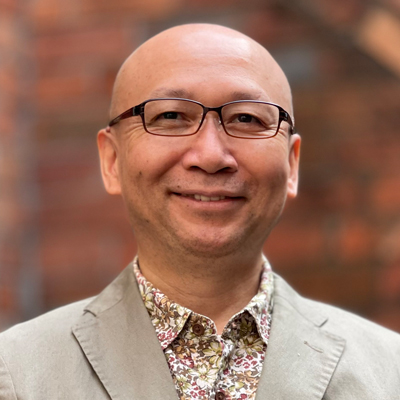
Institute of Professional Psychotherapy, Japan
Yukio Fujimi is a Certified Process Worker, Negotiation Analyst Level 1 of the Japan Negotiation Association, and a NPO Inheritance Advisors Council Certified Member. He has provided couples and family therapy for 32 years. He is also extensively involved in coaching for family business owners and executives of large corporations. He can be reached at gdmwx113@ybb.ne.jp.
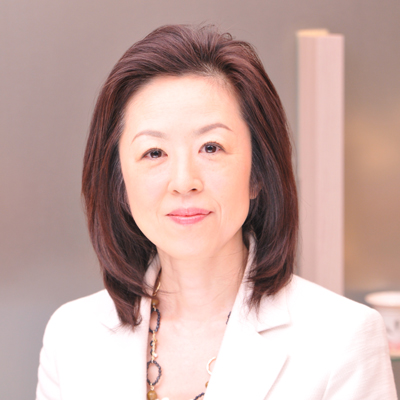
Institute of Professional Psychotherapy, Japan
Chikako Kishihara is the representative of the counseling office “Alchemia,” a clinical psychologist, and a certified public psychologist. She provides psychotherapy, coaching, and consulting services to individuals, couples, and families. She is a director of the NPO Japan Holistic Medical Association and a director of the Japan Transpersonal Society. In addition, Chikako is a Process Work (Process Oriented Psychology) Second Training Teacher, Negotiation Analyst Level 1 by Japan Negotiation Association, and a certified member of the NPO Inheritance Advisors Council. She can be reached at info@alchemia.in.
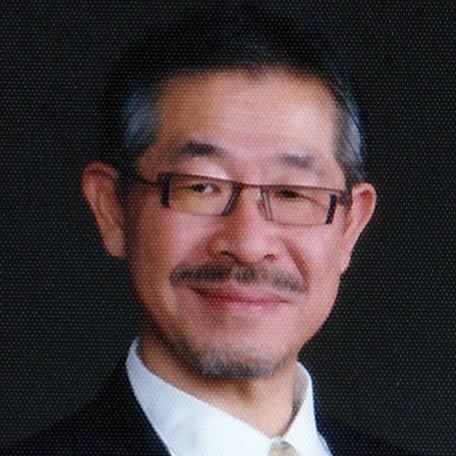
WellSpring Family Service
FFI Fellow Kazuyoshi Takei joined his family’s 100-year-old company as the fourth-generation president. In 2003, he built WellSpring, where he and his partner June advise business families and firms in Japan. He is a founding member of The Family Business Advisors Association Japan (FBAA). He can be reached at takei@wellspring.co.jp.
The Institute of Professional Psychotherapy is a center dedicated to supporting Japanese family businesses. The Institute provides coaching services for owners and executives in family businesses and offers relationship and family therapy to clients to grow their integrity and sustain their health and wealth.

View this edition in our enhanced digital edition format with supporting visual insight and information.




